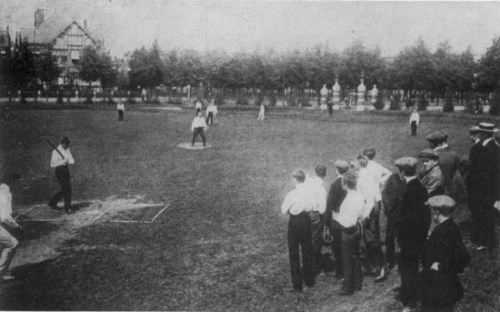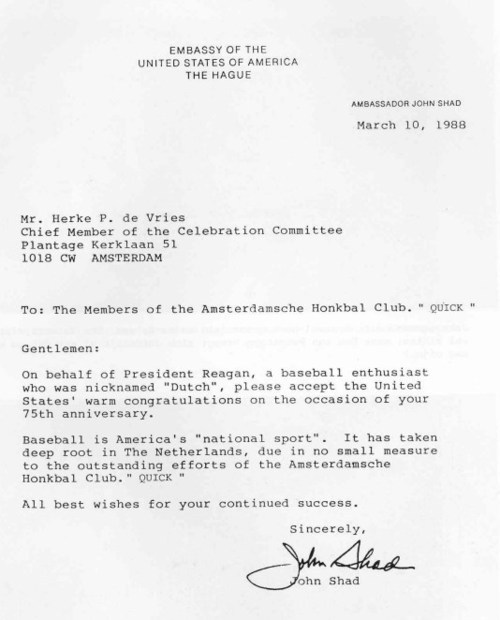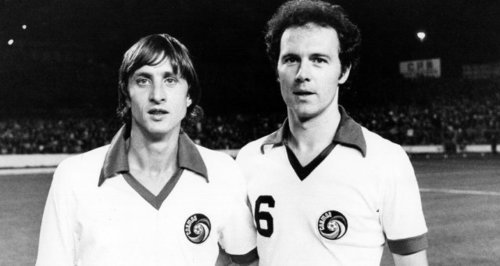When The Beautiful Game Met America’s National Pastime
When The Beautiful Game Met America’s National Pastime


By Eric Beard
“He’s been waiting for this moment his entire life. He’s just minutes away from hoisting up the trophy of his dreams. Holland has stayed up all night to watch their beloved Dutch maestro make history. They said it was impossible. Hell, I said it was impossible. Well, we’ve all been proved wrong by Mr. Cruyff. He has been absolutely phenomenal all series and is showing no sign of slowing down. My goodness! I’ve never heard the chants of "Johan” sung quite like this. It’s deafening! And there’s his last warm up pitch. He’s ready to go. Just look at that smile. Folks, it’s the World Series. It’s Game 7. It’s 1-0 in the bottom of the 9th here at Yankee Stadium and you better believe the world is watching….“
When you mention the Ajax team of the late 1960s and early 70s, there’s no denying that geniuses ran rampant throughout Holland and Europe for the better part of a decade. But what if I told you that Johan Cruyff and Johan Neeskens weren’t born to play the beautiful game? What if I told you that some of Holland’s finest athletes may have wanted the opportunity to pursue a career in another sport they adored?
Despite Ajax’s rekindled search for success in the Champions League, you can bet that Johan Cruyff will be watching more than football this week. The World Series, the "Best of 7” final of Major League Baseball, begins on Wednesday. Cruyff, Mr. Total Football, is absolutely inspired by America’s national pastime and its iconic clubs like New York Yankees, Boston Red Sox, and especially Chicago Cubs. And in Holland he’s not alone.
J.C.G Grasé is the Dutchman responsible for introducing baseball to his homeland, founding the oldest baseball team in Europe, Quick Amsterdam, in 1913. Amsterdam took to baseball instantly, with some of the first games taking place in the city’s famous Museumplein (pictured above). In 1922, Ajax dedicated a branch of its club to baseball. They were accompanied by respected franchises such as S.C. Haarlem, Blue White Amsterdam, Schoten Haarlem, O.V.V.O. Amsterdam, and Sparta Rotterdam. The newfound passion didn’t go unnoticed across the pond.

Given the strict regimen at modern football academies, it may seem inconceivable that Cruyff and Neeskens were both multi-sport athletes for a few years while they were rising through Ajax’s academy ranks. But when Cruyff wasn’t taking on defenders or practicing his shooting, he was a very good pitcher who also spent time behind home plate playing catcher.
Cruyff recently stated, “I have had a special interest for baseball since I was a kid. What a lot of people don’t know is that I could have been a youth international in baseball for the Netherlands. Because football was going so well, I had to quit but the special bond has always remained."
With such impeccable technique, it’s not difficult to imagine Cruyff as a brilliant pitcher. He would probably fit the mold of a Tim Lincecum or Barry Zito (in his prime). Just imagine, for a second, having to bat against Cruyff. He would destroy you. Aside from the effectiveness of his technically sound pitches, he would get inside your head so quickly that you just wouldn’t stand a chance. Then, he would send you back to the dugout with his signature pitch, "the Cruyff turn.”
This valuation of technique and attention to detail resonates deep within Dutch culture, which is likely why their society was so keen to adopt baseball. With all the analysis that goes into the perfect swing or the most efficient mechanics when throwing a curveball, it’s not difficult to see why baseball succeeded in Holland given the approach to other sports.
In 1972, Ajax needed to cut expenses and chose to shut down the baseball team after half a century. Parallels today can be drawn between the Dutch passion for baseball and the expanding environment of American soccer. The truth is that baseball in Holland could not have given prodigies like Cruyff the lifestyle that football offered. In America, the inverse is true. Though Major League Soccer is improving salary-wise little by little every season, the allure of the millions and millions of dollars baseball, football, and basketball offer are in a league of their own. America’s best athletes, unsurprisingly, go where the money is.

Cruyff continuing on to become a football legend was a logical choice, but was there not a hint of environmental determinism involved? Whether or not you want to plunge into the divisive Barça DNA and Lockean “clean slate” arguments, there’s no denying that a surrounding environment plays an influential role in establishing a child’s values. If Johan grew up in New York watching Roger Maris and Micky Mantle, would he be wearing the number 14 for Ajax or the New York Cosmos or wearing the Yankees pinstripes, ready to take the mound in the Bronx? The same argument is often developed with elite American athletes, such as Lebron James. If Lebron was born in Liverpool, would he still be bound for the NBA or would he be a center back that learns the true meaning of “You’ll Never Walk Alone” and earns £130,000-a-week? It’s tough to argue against the latter.
Regardless of what could have been, the fact is Cruyff chose football. Cruyff’s left a permanent footprint on the game, but he hasn’t forgotten about his second sporting passion. On October 15th, the Netherlands won the 2011 Baseball World Cup. Using this Dutch triumph, Cruyff focused on the power of a winning spirit in his column for the De Telegraaf on Ajax’s potential to succeed in the Champions League. Ajax’s European path is an arduous one, but if Holland can win an international tournament in baseball then who on earth is to belittle Cruyff’s aspirations? Today, the proud tradition of baseball in the Netherlands lives on and it’s propelled by Holland’s most iconic figure in sports.







